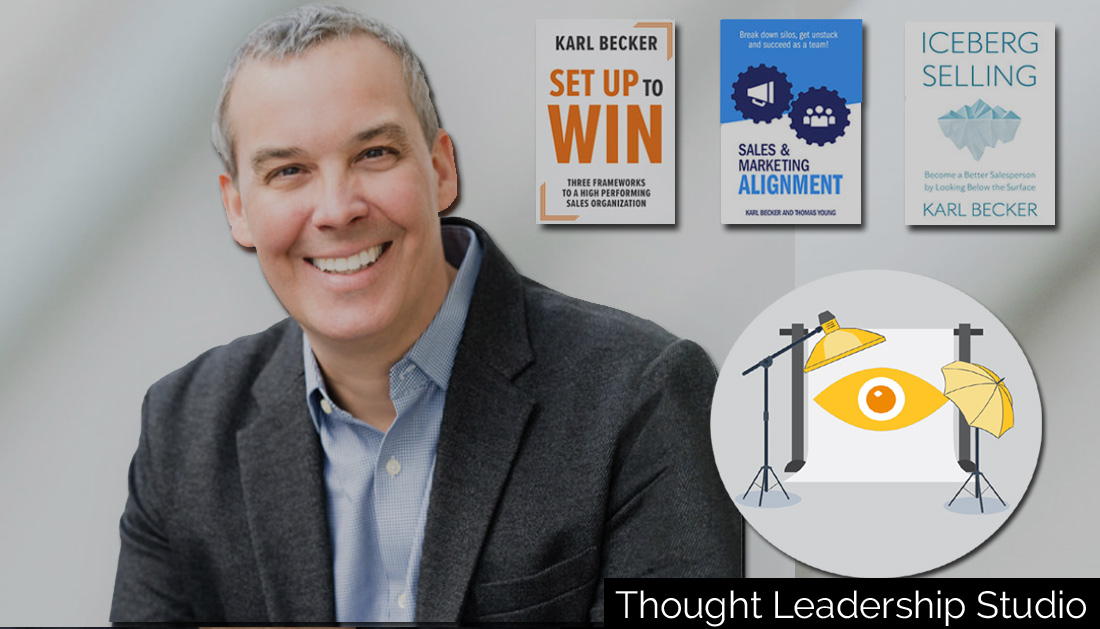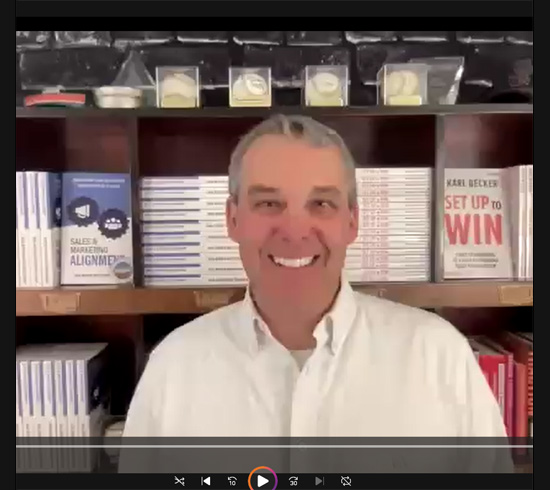Thought Leadership Studio Podcast Episodes:
Beneath the Tip of The Sales Iceberg with Karl Becker
Episode 58 - Look beneath the surface in sales, and understand the 90% that isn't immediately visible to forge better connections and solutions.

#authors, #communication, #customerexperience, #influence, #insight, #interviews, #persuasion, #sales, #scalingbusinessgrowth
Or Click here to listen or subscribe on appWhat this episode will do for you
- Empower Your Sales Approach: Gain insights from Karl Becker's personal journey and how overcoming feelings of disconnection and learning differences shaped his unique, successful approach to sales and team building.
- Learn Iceberg Selling: Discover the concept of Iceberg Selling to delve beneath the surface in sales, understanding the 90% that isn't immediately visible to forge better connections and solutions.
- Curiosity as a Sales Tool: Understand the power of curiosity in sales to uncover deeper customer needs and motivations, moving beyond surface-level transactions.
- Mastering Relationship Selling: Learn how to transition from a transactional to a relational mindset in sales, focusing on the lifetime value of customer relationships.
- Co-Creation for Success: Explore the technique of co-creating solutions with customers to enhance buy-in and ownership, leading to more organic and successful sales outcomes.
Karl Becker.
In this episode, we're excited to introduce Karl Becker..
In this podcast episode, I interview author and speaker Karl Becker about his upcoming book, "Iceberg Selling." Becker shares his personal journey and pivotal moments that led him to his unique perspective on sales and marketing.
He emphasizes the importance of understanding and connecting with others, as well as the need to relax into the sales process and focus on long-term value and being of service. Becker also discusses the concept of "Iceberg Selling," which highlights the idea that everything is an iceberg, with only 10% visible on the surface and 90% hidden below.
He encourages listeners to approach conversations and relationships with curiosity and to explore what lies beneath the surface. Additionally, Becker shares insights on aligning key performance indicators (KPIs) with company values and offers advice for aspiring authors and consultants.
Some of Karl's coordinates:
Curated Transcript of Interview with Karl Becker
The following partial transcript is lightly edited for clarity - the full interview is on audio. Click here to listen.
Chris McNeil: I'm Chris McNeil, with Thought Leadership Studio, and I'm sitting here across Zoom with author and speaker Karl Becker, who has founded and run numerous companies over the last 30 years and now runs Improving Sales Performance, a sales consultancy that builds high performing happy teams. Karl's an author of multiple books on sales, and we're going to be talking about one of those that's coming up in the near future today called Iceberg Selling. Welcome, Karl.
 Karl Becker: Awesome. Yeah, thank you for having me. I love the impact that you provide with this podcast and really appreciate you letting me be here to share some thoughts.
Karl Becker: Awesome. Yeah, thank you for having me. I love the impact that you provide with this podcast and really appreciate you letting me be here to share some thoughts.
Chris McNeil: Appreciate you too, and sure. This is going to be really interesting to the listener. You've got a lot to share from our conversation before starting recording, but we like to talk about pivotal moments sometimes and was there a particular event or shift in life to set you on a path that you're on now and empowering people with your unique perspective on sales and marketing?
Karl Becker: Yeah, probably two big ones that jump out and I'll be a little concise. The first is I get back to when I was a kid for whatever reason, I just never really felt like I was a fit. When I was in school, I had friends, but I never felt like I really connected and learning was really hard for me. And much later as an adult, I learned that I have stealth dyslexia, but I think the pivotal moment early on was I had to learn about the world, not just from traditional ways, but from doing and experiencing listening, hearing.
Finding Commonalities, Relaxing to Strategy and Team
And a big part of not feeling connected was how do I learn to connect? How do I learn to find commonalities with other people? And since I was a little kid, that was kind of my survival mechanism. I had to learn how to navigate in the world, learning in a different way and connecting with people so that I had a sense of belonging.
And that has served me so well as I've become older and older and older and been in the sales profession, both running my own businesses and coaching because so much of being a leader, a consultant, somebody that's helping solve people's problems, which I think is what you do in sales, is about understanding and about connection. So that was a big pivotal moment for me.
The second one, I was that entrepreneur that would stay up late work every weekend, and you would hear me say this, and I have this, it's burning my brain. I'm in this peer group session with the whiteboard. I'm like, no one else can solve my problem. No one else can do this. And they all looked at me and some of them started to laugh because I think many of them had had this aha moment like Karl, you finally had the breakthrough moment where you're sick and tired of being sick and tired, and you need to realize you need to relax to strategy and team. You need to kind of relax into letting other people be their best, bringing themselves forward. And those kind of combinations I think have allowed me to be somebody that now really on team and people and bringing out the best in people again because of these experiences that I had.
Chris McNeil: awesome. So I'm picking up on a couple of things here, and I can relate to having a non-traditional learning style. I never fit in a classroom of 30 people with one person writing things to remember on a board, but I love to learn. I just have a different way of learning and this whole relaxing into things. And that's a point that was hammered into me by a guy who studied sports psychologist who worked with Olympic shooters using biofeedback and found they were much more accurate when they could relax into the shot and maintain that as you squeeze the trigger.
Karl Becker: Right. That's counterintuitive.
Chris McNeil: Yeah, it's counterintuitive, but it's kind of a theme, isn't it? And I am fascinated by the work you do as a sales trainer consultant coach, because to me sales is all about empowering people and it's empowering them to maybe do more than they could have before the interaction by pointing out things that maybe they didn't notice that they could take advantage of to enrich their lives.
So what are the key unique components of your vision of sales that you think would be relevant to our audience of people who are interested in influence in general?
Karl Becker: Yeah, thank you for asking that. So the first thing I would tell you is in this book, Iceberg Selling, the whole concept is everybody, everything, every challenge is an iceberg. And the reason I did that is it's so easy to remember. I can tell you in 10 seconds, 10% is above the surface. And that's what we see day to day and 90% is below.
 So if we're trying to understand somebody or in sales solve somebody, or as a leader or a change agent, get movement forward, if we're only focusing on that 10%, we're missing so much that we could be misaligned, misinformed, even if we have the best intent of what we wanted to do to move something forward, we're risking that. We're missing a big part of that. So I really believe just the first is this realization that everything is an iceberg.
So if we're trying to understand somebody or in sales solve somebody, or as a leader or a change agent, get movement forward, if we're only focusing on that 10%, we're missing so much that we could be misaligned, misinformed, even if we have the best intent of what we wanted to do to move something forward, we're risking that. We're missing a big part of that. So I really believe just the first is this realization that everything is an iceberg.
And until I start to explore what's underneath that water, that other 90%, I'm at risk of missing connection, missing problems, missing solution, whatever it might be. So that's kind of the first part that I like to focus on is just think that way, think that everything is an iceberg.
Chris McNeil: That's awesome. So in context of sales and persuasion, what might be some of these things that are underneath the surface that we would miss without that kind of deeper inquiry?
Karl Becker: Yeah. Well, first I would say a part of discovering that is just getting really good at being curious, seeking to understand. So you might have a conversation where let's say you're doing some sort of relationship type solution selling where somebody comes to you with a problem, we'll make one up, we'll see if I can do it on the spot. But let's say somebody has a challenge with managing teams or managing projects within their organization.
The Curiosity to Explore Under the Surface
They're looking at all these different types of solutions, and there's things like Asana and other SaaS programs out there, and there's also consultants and trainers. Well, if somebody shows up and just starts to say, Hey, I need to buy a software product because the CEO told me that we're not good at project management. And you go, oh, okay, what's your budget? Boy, we're going to miss the mark because potentially they're not even ready yet for a project management software.
And again, I'm making this on the fly, so I would want to go. Awesome. Well, but I'm happy to help you. That's how I would land. I'm happy to help you, but are you open to spending maybe five or 10 minutes letting me explore what's going on, ask you some questions. I'm going to probably even start with a beginner's mindset a little bit. I might ask you some things that I think I know the answers, but I'm really looking for firsthand here.
What's your company? Why is this a challenge for the CEO? What's your role? If you were able to solve this, what would it do for you and your team? What have you done before? Is this the first time you've looked at it? Notice I haven't said budget or how soon you're going to buy. I'm not walking through this kind of tactical sales approach.
I'm really seeking to understand because what might happen is I learn this person's new to the job, they just got acquired, they just had their project manager leave because it was so stressful or the whole team left. There's a gazillion things. But if I just went right to budget time, have you seen it? What features do you like? I could miss everything. And if I'm in kind of the world of solution selling where I can provide a somewhat custom solution, boy, if I can get clear, then I can move to co-creation. I can be like, Hey, what do you think? Are you okay?
You need to brainstorm a little bit. And as soon as someone starts to get enrolled in that journey with you of co-creating that solution together and brainstorming, I hate to say it like this, but they're kind of already buying themselves in, but they're also being heard and they're sharing how they want to solve it and they're owning it. And that's the secret. When somebody else can own the change with you, you don't need to do training, you don't need to convince, you don't need to persuade. It's a much more natural path to a shared outcome.
Chris McNeil: I love that. And to regurgitate it in my model in a way that may be helpful to the listener is kind of entering into their world. And I think for a lot of us who might have a limited model of what selling is, we might have to interrupt our pattern of jumping to the close to do that is what I'm understanding.
Well, when you're coaching people in sales and you notice that predisposition to jump to the close or to gloss over that process of thoroughly entering into the world of the person you're helping, what methods or what processes do you think would be helpful for our listener to understand that can help you make those kinds of interventions?
Karl Becker: Yeah. That's a really great question. It reminds me of a quick story. I'm going to tell you a story and then most likely I'll move to answering that question. So I come in and I'm working with teams, or it might be at a conference or a workshop or I'm coming in to maybe run a meeting once or twice a month with a team. That's kind of like part workshop, part sales meeting. So I'm in one of these part workshop part sales meetings, and I've been with this company for a while. There's maybe about 10 salespeople, and two of the salespeople are kind of way at the top, but they're partners. They've been doing this for 20 some years, professional services. So I said, you know what, I'd like to get three volunteers and I'm going to just workshop this in real time and let's listen to how people would do it.
And I said, here's the scenario. I want you to imagine you're at this trade show in Las Vegas with our ideal customer, and you can have whatever scenario you want, but you have the opportunity to talk to somebody, what would you do? And I intentionally call on this one sales guy, and I love him to death. We've done a lot of coaching, but he was stuck in this, how do I get to the close? He's like bottom of the funnel, constantly talking about the transaction.
And I called on him very first. It was strategic, and he's like, oh, he's super excited. He's like, well, I would be at the coffee bar and I would order a cappuccino and I would turn, and this guy would be next to me and on his shirt it would say, X, Y, Z company, and that would be a fit.
And I'd be like, Hey, what are you ordering? What do you do? Oh, you know what? We could help you. And this is how we're so good. He goes right into feature benefit, boom, boom, boom, boom. And everything he said was accurate. He didn't make a mistake, but in his mind, the sales call started at the close. And I think that's the trap we fall into, especially when we start to work with marketing, things like that. Hey, do I have the sales ready lead? Do I have a buy ready lead?
That's what we're really trying to say. And in a lot of businesses, that's just not the truth. We've got a long journey ahead. So juxtaposed that, I talked to the senior person who's been there a long time said, Hey, how would you, what's your scenario? And this was beautiful genius. She was like, Jedi, mind trick master Karl. It would start in the plane.
I would sit down and I would turn and my ideal customer would sit down next to me. They'd pull out their laptop to start working. I would see on their laptop bag the name of the company. I would realize that's one of our customers. And I would say, Hey, what are you up to? Are you going to this trade show in Vegas? I'm going, oh, why are you going? What are you hoping to get out of it? How long have you been in your practice? What's it like?
She starts asking all these iceberg questions. She is like, I've got three hours on this plane. I want to get to know this person. And then she says at the end, I would say, Hey, if this seems like an opportunity for us to continue to learn, I'd love to meet you while we're at the conference.
Understanding and Solving is the Event
Or could I have your card? Maybe we could schedule something. She didn't see the sale as the event. She saw the connection and the ability to understand and solve as the event. So part of the way I train is telling somebody a store like that and then asking them, think of the person, your next couple of appointments that are follow-ups. And I use what you said. I go, can you tell me about their world? And if they can, then they're into solution selling. They're into understanding the iceberg.
But if they're like, well, their budget is this, they're going to buy in that, I'm like, no, what's their world? So a lot of it's just a shift of understanding that sales isn't about the transaction at the end. That's the output. That's not the input. That's not what we do at first. We don't just jump into closing. We have to understand, learn iceberg. And then if we do that right, actually I find that the person that wants to buy, well ask me or tell me they're ready to buy. I don't need to persuade or convince they've opted in. If I've co-created the solution together, they want it.
Chris McNeil: I love this whole co-creating the solution together. This shared creativity space is very appealing. And I'm noticing a book behind your right shoulder -- Sales and Marketing Alignment. And to the listeners, obviously it doesn't just apply to sales, but it applies to marketing.
Karl Becker: Absolutely.
Chris McNeil: An audience of an organization or solopreneur is going to have a lot of common factors about their story that we can be curious about, would they not?
Here's a question for you. Do you find that the wrong kinds of performance objectives can drive that jump to the closed mentality ... if you're not careful?

Playing for Lifetime Value
Karl Becker: Boy, I am so glad you said that because in this book we've been talking about iceberg selling. There are four mindsets. The first mindset is lifetime value. The second is being of service, and they're kind of like brother and sister. They're tied together. And what I mean by lifetime value is are you playing for the transaction, that immediate sale, or are you playing for all the sales, all the work, all the relationship over time? And even if you sell cars, people still go through cars 2, 3, 5, 6 years. There's still a long-term value of a family. They might have a kid who's turning 16, they might buy another car.
So it is not just heady around, oh, well, my business doesn't have lifetime value. It probably does because a lot of your customers move to another company and we have that experience where people bring us with them. So the first part is trying to relax into that. I'm playing for lifetime value. I'm not playing for this immediate transaction. And I think for our manager, an owner and even a salesperson that's trying to make the end of the month, end of the month, end of the month, that's hard to get around. And I would say internally in your company, there's probably some conversation here, but imagine we all kind of know what happens at the end of the month. Fire sale, Hey, any chance you can buy today
Chris McNeil: Right
Karl Becker: No, that's jeopardizing the relationship potentially. So it's more of a it's, not binary. It's like don't do that. But it's like be mindful that how you're showing up and the actions you're taking, if it's jeopardizing the long-term value. And the second just to kind of put a little cross the T on it being of service, it's really tied that if you're playing for long-term value, you have the opportunity to show up in different ways over time that you might not do If it's a transaction, the simplest would be someone's not yet ready to buy. You don't just keep calling them and be like, Hey, you ready? You ready? Whenever you're ready, I'm ready.
 That's not of service. Service is, Hey, I saw this conference, I went to this conference, somebody handed me this book. I'm going to send it to you. Here's APDF, here's a blog, here's a podcast, here's a podcast that influenced me. I'm going to share it with you customer, because I think it would be value based on what we talked about. You're looking beyond the sale to truly solve all of that person and be of service to all of the person. So that's two things that I think help us get out of this mindset of close, close. And I do think a lot of times KPIs are misaligned to the values of a company.
That's not of service. Service is, Hey, I saw this conference, I went to this conference, somebody handed me this book. I'm going to send it to you. Here's APDF, here's a blog, here's a podcast, here's a podcast that influenced me. I'm going to share it with you customer, because I think it would be value based on what we talked about. You're looking beyond the sale to truly solve all of that person and be of service to all of the person. So that's two things that I think help us get out of this mindset of close, close. And I do think a lot of times KPIs are misaligned to the values of a company.
Aligning KPIs with Values
Chris McNeil: So in terms of aligning KPIs to the values of a company, knowing what I know about listeners, at least some are in a position of designing sales systems or they have the opportunity to intervene on the design level. What would you suggest to get KPIs aligned with those values that support this kind of deeper relationship with a customer where ...
Karl Becker: Yeah, that's an excellent question and one my brain's going to have to process in real time. The first thing I would say is hopefully you have a culture where you make a lot of your decisions, if not all of them align to your core values. And so to me, the first thing is my marketing is my messaging. The people that are the physical representation of my brain, are they all living these core values? And if so, do we have the discipline that when we are attracting people that want to work with us, that we have the discipline to put them in two buckets? Yes, they're aligned. No, they're not.
And if they're not, give them a no, a no. But hey, we might not be the right fit, but there's this other company over here or here's this other solution. I think that's super powerful. And while that's not a KPI, so to speak, I think it needs to start there. We need to get clear that this is important to who we are. We have a mission, we have core values, and everything should be driving toward that. So let's now figure out how to build KPIs to those things.
I'll give you a real world example that just happened to me yesterday. I was running a workshop for our company in construction manufacturing space, and each salesperson has about 10 really big accounts that account buys from them year over year. They're like ACE hardware, true value hardware, things like that.
And we spent the whole day trying to understand the customer's experience, what is their world was, what was your world exercise? And what we're doing is we're going to create kind of like a place mat. You could think of it like a persona, but it's a place mat of like, who is this person? What's going on in their life? What can I learn through research? What do I know from prior notes? And in this season, because there's three selling seasons, different selling seasons with different characteristics, what's their pain? What do they need? What's their magic wand?
And the idea now is each salesperson has to commit to their top 20 accounts or whatever to fill this out before each sales season meet with their supervisor, their director, and get into conversation. So the KPI there is, did you do it? And have you been in the meeting with your team to talk through this? Because we think it's going to be so important to show up and really understand that person. So that's maybe not a performance KPI, but a reminder KP, I
Think the other ones is if you're showing up and you're doing NPS scores or something like that where it, it's how satisfied are your customers and again, they're aligned to your values and your mission and in your product is then hopefully that's a pretty good guide from satisfaction from sales. Maybe it's a qualification. I went through a qualification status and what's my ratio of leads to qualify leads to good fits? And that might be something you give back to marketing, back to sales and marketing alignment. Like we're asking marketing to make sure 80% of them are a cultural core value fit and the sales person's grading that. It can be little things like that. But really I'm after directional KPIs. I like directional KPIs versus hard nos binary.
Selling Seasons
Chris McNeil: That makes sense. And I guess the challenge is so much of the good things that happen with the relationship based selling process are emergent and to caring about the customer and caring about helping people and helping them unfold their worlds to a greater value through what you can offer. But if you remove all measures, then people need some structure to work within and some feedback that they're doing the right things too. So it can be a challenge. You mentioned the three selling seasons. What'd you mean by that, by the way?
Karl Becker: Well, in their particular industry, there's three cycles throughout the year. So it's not a uniform selling site season.
 A lot of you in seasonal businesses, you might have that in the wintertime when it's cold out. If you're selling into that space, you probably sell less construction material, but in the summertime more. But they're buying it in the spring trying to make sure they have enough material. So for them, not only did they have to have the mindfulness of the people they sell to and what's their world, but they had to realize that that person's world changes throughout the year in their own selling cycles.
A lot of you in seasonal businesses, you might have that in the wintertime when it's cold out. If you're selling into that space, you probably sell less construction material, but in the summertime more. But they're buying it in the spring trying to make sure they have enough material. So for them, not only did they have to have the mindfulness of the people they sell to and what's their world, but they had to realize that that person's world changes throughout the year in their own selling cycles.
And a lot of the people listen, you probably have some sort of seasonal or there's something macroeconomic that adjusts or fit, maybe it's interest rates, but there's things that start to affect the day-to-day of your business. And understanding those effects as well as the people is about getting their world. And once you know that, or you see more of the iceberg, I believe you can be a lot more of service co-create the next steps, become really natural and predictable once we're showing up that way and we start to change how we sell and connect with people.
Chris McNeil: That's excellent. And how much of this pivots on the channel knowing that, and today I'm of an age where we did direct phone selling when I was young, and now we have all these social media channels where you might be talking to prospective customers over Twitter or LinkedIn or X as we call it, used to be named Twitter. How much of a pivots versus the channel or do you address that in your work??
***************************************
The transcript is lightly edited for clarity and is a partial transcript- the full interview is on audio. Click here to listen.
***************************************
Free Stuff and Offers Mentioned in Podcast
***************************************
***************************************